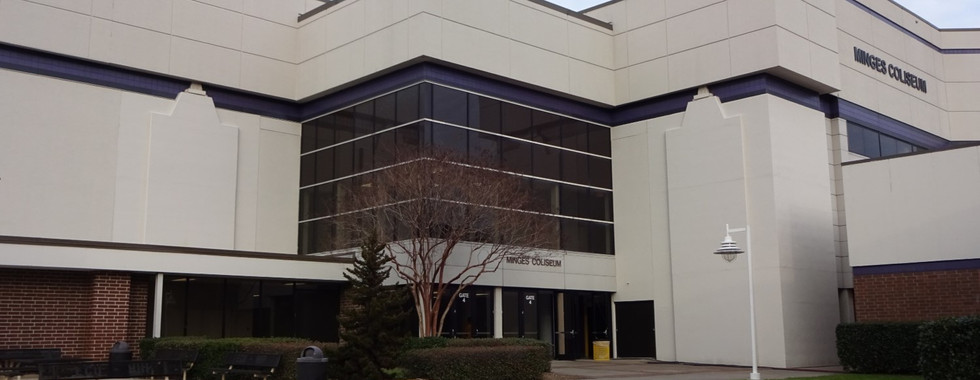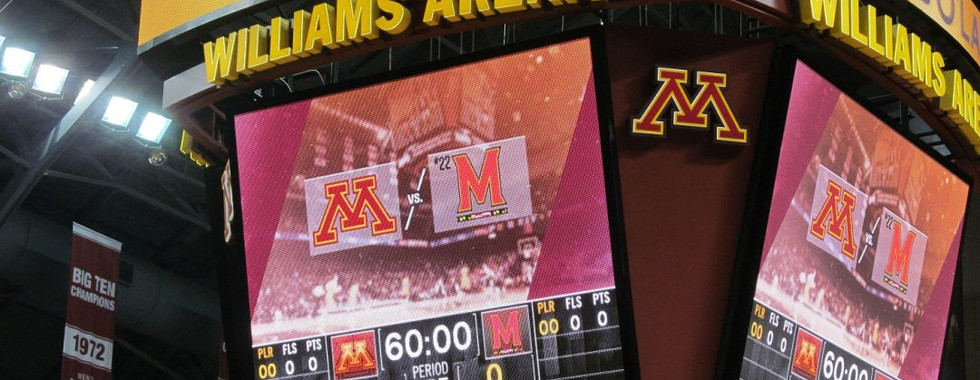Williams Arena - Minnesota Golden Gophers
- Lloyd Brown

- Nov 16, 2018
- 8 min read
Updated: Jul 23, 2025
Photos by Lloyd Brown, Stadium Journey
Stadium Info FANFARE Score: 3.86
Williams Arena 1925 SE University Ave Minneapolis, MN 55455
Year Opened: 1928
Capacity: 14,625
Gopher a Trip to “The Barn”
The Big Ten Conference has long been known for some of the most historic athletic facilities in the country. Ohio State has its Horseshoe, Michigan has its Big House, Indiana has The Rock and the University of Minnesota has “The Barn.”
One of the oldest basketball arenas still in use in the college ranks, Williams Arena was built in 1928 and is fondly referred to as “The Barn” by the Gopher Nation. It earned its moniker due to its barn-like design with its rounded roof and beamed supports. Gopher fans willingly embrace the nickname, as the luxury boxes are known as the Barn Lofts, and the student section is known as the Barnyard. Like the Midwest structures of old, The Barn has served multiple purposes over its long existence.
In addition to serving as the home of Gopher basketball, the building has served as an indoor practice facility for football, an ice hockey, an indoor track facility, and multiple tennis courts. To facilitate these multiple uses, the basketball court is elevated above the floor of the arena. Benches for both teams are two feet below the playing surface, and coaches are the only persons other than the playing personnel and the referees to be at court level. This unique feature is only found at two other schools, Vanderbilt University, and Butler University.
Williams Arena has gone through several updates through the years, which has resulted in increases and decreases in seating capacity. Its current basketball capacity is 14,625. Amongst the most recent renovations are new lighting and sound systems, a new scoreboard with a video screen, and the creation of 21 luxury suites known as the Barn Lofts.
The University of Minnesota has had a long and storied basketball history, as it has won two National Championships and nine Big Ten Championships, and has participated in 15 NIT Tournaments. Several Gopher stars have gone on to great NBA careers, including Lou Hudson, Mychal Thompson, Kevin McHale, and Kris Humphries. It also has a lineage of notable basketball coaches, including Bill Musselman, Bill Fitch, Clem Haskins, and Tubby Smith.
Food & Beverage 3
There are several Snack Shack concession stands spread throughout Williams Arena, which sell your typical arena/stadium fare. A sampling of their food and beverage items and their cost includes barbecue pork or chicken sandwiches ($7), cornbread muffins ($1.50), hot dogs ($5.75), pretzels ($4), garden salads ($5), popcorn ($6), kettle corn ($7), candy ($3.25) and chips ($1.75).
The beverage items are limited to Coca-Cola brand sodas ($5) and bottled water ($4.25). No alcohol sales are allowed, due to Williams Arena's on-campus location. In addition to the arena stands, there are branded concession stands carrying Famous Dave’s BBQ, Subway sandwiches and salads, and Palermo Pizza. The Goldy’s Locker Room team store stocks a full assortment of Gophers paraphernalia at numerous sites throughout the arena.
Atmosphere 5
The best way to describe the atmosphere and feel of Williams Arena and a Golden Gophers basketball game is “old school.” This is meant in a very complimentary way, as the University of Minnesota realizes it has a historical treasure on its campus and does not want to detract from that. The arena looks very much like it did back when it was built in 1928. The outer concourse features a great timeline outlining the history of the facility, culminating with a special exhibit that includes a portion of the original floor of the arena.
From the time you enter “The Barn” until you find your seat, you’ll feel transported back to an earlier, simpler time in college basketball. The outer concourse has cinder-block walls and concrete floors, and it will become immediately clear when you enter the inner arena how Williams Arena earned its more popular moniker. The arched roof with the beams showing gives the feeling of a barn-like structure. True, there are some modern-day upgrades, such as improved lighting and a very impressive video/scoreboard, but these are necessities in an era where almost every game is televised.
If you are coming to a Gophers game at The Barn, don’t expect the arena lights to be turned out and special effects show to take place for player introductions. The excitement generated here comes from the cheer squad, the University pep band, and a very enthusiastic student section (alias the Barnyard).
The views from the seats of the court are great unless you are unfortunate enough to sit behind one of the support beams holding up the second level of stands. The second level of the arena is old school. To reach this area, you need to take a winding staircase, and remember to stop for the restroom or to buy your refreshments before making your ascent. The 1928 design does not include restrooms or concessions areas on the second level. If you are seated in the east end zone of the upper level, expect bench seating rather than seats.
One other design change Williams has made to keep up with the other members of the Big 10 Conference is the addition of some “luxury boxes.” Even this change keeps true to this building’s simple bones. The luxury boxes are known as “Barn Lofts,” and consist of three rows of seats with a very simple kitchenette and a bathroom attached.
Williams Arena realizes the star of the show is the game being played on the court and does its best to keep the distractions away from that at a minimum. Any thoughts on building a new facility with more modern features are quickly dismissed by the fans and students of the school.
Neighborhood 4
Williams Arena is located within the sports complex on the University of Minnesota campus. It is located adjacent to TCF Bank Stadium and the Mariucci Arena. The name of the neighborhood surrounding these facilities is Stadium Village, for obvious reasons. Washington Avenue is the main thoroughfare for the neighborhood, as it serves as the address for a majority of the restaurants, nightclubs, and lodging facilities in the area. It also forms the route for the Metrorail light rail system that covers virtually all of the Minneapolis-St. Paul metropolitan area.
There is a wide variety of restaurants to choose from that are just a few blocks from Williams Arena. These include Buffalo Wild Wings, D’Amico & Sons, Punch Pizza, the Beacon Public House, and Applebee’s. Stubs & Herbs Pub is a longtime UMinn favorite watering hole. Lodging in the area includes The Commons, the Aloft Hotel, Days Inn University, and the Doubletree by Hilton University.
The two Metrorail stations on the Green Line servicing this area are the Stadium Village Station and the East Bank Station. The light rail system does a great job of getting you to a majority of the Twin Cities' major attractions, with stations at the Mall of America, U.S. Bank Stadium, Target Field/the Target Center, MSP International Airport, and the State Capitol in St. Paul.
Fans 4
The Gophers have one of the most energized fan bases in the Big Ten Conference. This is especially true in the student section, otherwise known as the Barnyard. It is a farm version of the Cameron Crazies, with students wearing the maroon and gold colors of the school, farm wear such as maroon-and-gold-pinstriped bib jeans and straw hats.
The most dedicated members of this section even don costumes of such barnyard animals as pigs, chickens, cows, and goats. The noise the Barnyard generates during a game can distract the opposition, especially when the team benches are located below the playing floor level, virtually in the seating section.
The Gophers draw good crowds for any Big Ten matchup, but their most intense rivalry is with the University of Wisconsin. The two schools compete in the Border Battle, a competition that awards points to the victorious school in more than 17 varsity sports, with the winner named at the end of each academic year. This gives bragging rights to the winning school for the next year.
Access 3
City planners and university officials in the Twin Cities have done an excellent job in designing a very walkable environment and easily-accessed area via public transportation. This is very important, due to the very frigid winters found in Minnesota. The restaurants, lodging, nightlife, and public transportation mentioned in the
Neighborhood sections are all within a 2-3 block area of Williams Arena. The Metrorail system runs very frequently, with extra trains scheduled when there is a sports event going on at the University. For those who prefer to drive to the game, there are two parking decks open to the public (the University Avenue deck and the 4th Street deck), both of which are within three blocks of the arena.
As you would suspect, with a building that dates back to 1928, accessibility within Williams Arena is not as modern as many of its peers in the Big Ten. The building has two main entrances, which get very backlogged when you have a crowd of more than 14,000 fans entering the building. The concourses are quite narrow, and fans accessing the upper level must navigate a winding metal staircase to reach their seats. There are no concession stands on the upper level.
There are elevators available, but they are restricted for use to persons with mobility problems and fans with seats in the Barn Lofts. Another shortcoming of the building is that it has only eleven restrooms (five for the men and six for the women). Needless to say, the lines are horrific for these facilities, especially during the halftime break.
One last structural issue is that there are several obstructed-view seating areas within the arena. The upper deck prides itself on being near the playing surface, but as a result, some of the lower-level seats are beneath the overhang and will be able to see the playing floor, but not the scoreboard. The other source of obstructed views is support poles that help hold up the second tier of seating.
Despite these inconveniences, Golden Gopher fans do not put up much fuss. The university has proposed building a new facility to house the basketball program, but the overwhelming response from the alumni and students has been to preserve The Barn as it is, because that is what makes the Gopher basketball experience so different.
Return on Investment 4
A trip to a UMinn basketball game does not necessarily dig a Gopher hole in your wallet. Tickets come in five different price zones ranging from $20 to $50. Due to the arena’s raised basketball floor, a cheaper seat may provide a better view of the game than a courtside seat, as the front-row fans are looking up at the action.
Riding the Metrorail ($6 for a 24-hour rail pass) allows you to miss the traffic and a $10 parking charge, and the concessions are well-priced. In addition, the Big Ten typically offers some of the best basketball teams in the country, so you’ll be watching a quality game.
Extras 4
The first extra has to go to “The Barn” itself for surviving and thriving since 1928. Its original cost back in the day was $650,000, which in today’s dollars would equal $9 million.
The second extra point goes to the Denny Stanford University of Minnesota Sports Hall of Fame. It is located across the street from Williams Arena at TCF Bank Stadium. Call ahead for operating hours, as they can vary in the winter.
The Twin Cities are a pair of great sports towns. With a little planning ahead, you can catch a UMinn hockey, basketball, or football game during the day, and then catch the Metrorail to a Vikings, Timberwolves, or Wild game in the evening, all in temperature-controlled indoor facilities.
It is easy to add a little culture to your sports pursuits, as Minneapolis is a mecca for museums, concert halls, and theatres. The Guthrie Theatre is on the West Bank of the Mississippi River, directly across from UMinn on the East Bank. There is an enclosed bridge spanning the river and connecting the theatre with the University.















Comments